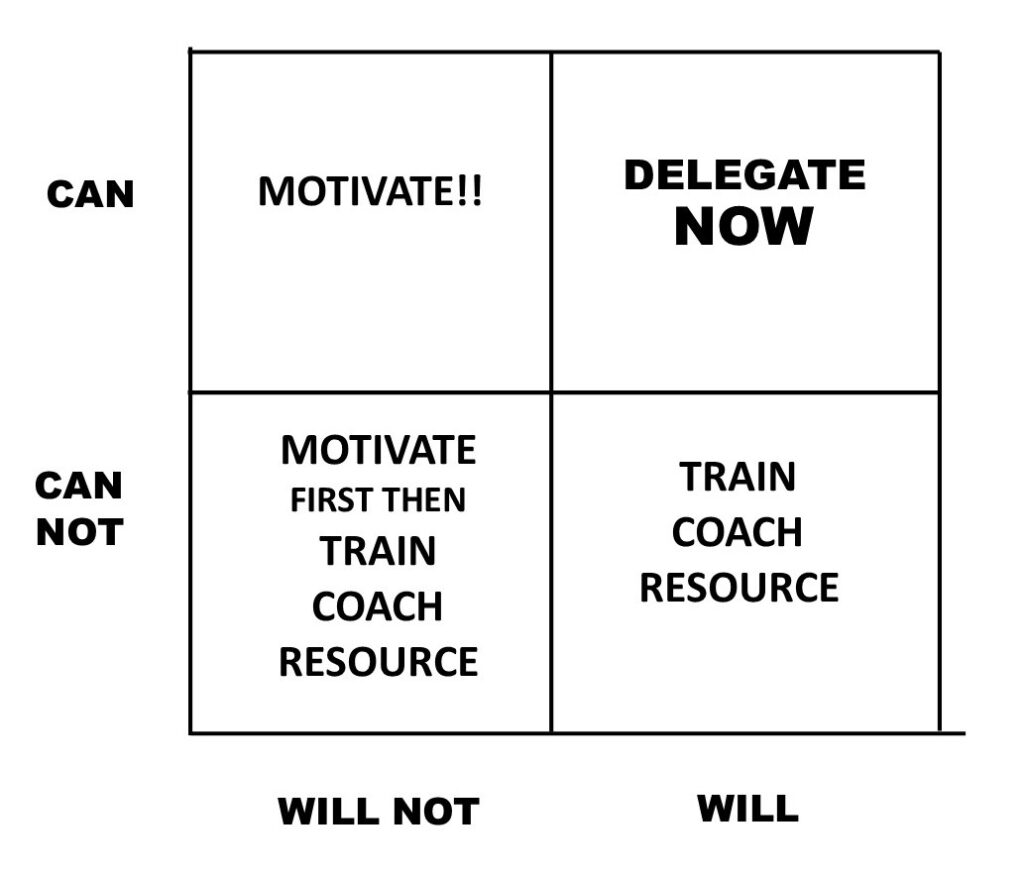The Two Essential Questions of Effective Delegation
I posted last time about the issue of DELEGATION. Since there are so many important and interconnected elements to effective delegation, I decided to continue this topic with added insights and additional tips.
This blogpost introduces the two-pronged question that every manager must address when delegating or giving a work assignment to a team member:
Can They? Will They?

Can They? Is the question of COMPETENCE—Can they do the job? Can they fulfill the assignment? Do they have sufficient skill, training, resource, authority?
Will They? Is the question of MOTIVATION—Are they willing to do the job? Are they engaged enough to take on the assignment with sufficient energy and determination?
The answers to these questions determine what the boss needs to do, to effectively manage the performance of a subordinate. The graphic below summarizes a manager’s appropriate response, in each case:

CAN / WILL is the ideal combination of answers to these questions.

The manager is ready to give this subordinate an assignment because the worker CAN do the job (they have the skills and resources necessary) and the employee is WILLING to do the job (they are motivated to take on the assignment and see it through successfully). In this case, the manager can go ahead and apply basic management oversight to ensure a clear assignment and an successful outcome.
CAN NOT / WILL is less than ideal, but offers the assigning manager a clear path forward.

In this case, a willing employee needs training or coaching or resourcing of some kind in order to take on the assignment successfully. The boss must determine exactly what prevents the employee from performing and address each need specifically and practically. That might include things like:
- Permission to act (official authorization of some kind)
- Authority to act
- Training
- Coaching
- Equipment of some kind
- Budget
- Additional personnel
- Cooperation from another team or department
- Possibly the ability to put other assignments on hold in order to take on the new assignment
The advantage of CAN NOT / WILL is that the toughest part of delegation is already a given—employee motivation.
CAN / WILL NOT is a bit of a challenge.
The subordinate has the skills and resources to succeed. But the delegating manager must find a way to connect with the employee’s personal and internal incentives, to ensure they have the will and determination to take on the assignment and complete it successfully.

Here’s the challenge: Internal incentives are highly individualized and vary from person-to-person. So the boss has to know each subordinate well enough to have identified their particular internal motivational “buttons.”
Internal incentives come in all shapes and sizes.
- Personal financial goals
- Professional development goals
- Personal growth goals
- Challenging work
- Key roles and responsibilities
- Recognition of various kinds
- Interpersonal interaction at work
- The ability to work independently or remotely
- The ability to work cooperatively or collaboratively
- Meaningful assignments
- Visibility with higher-ups
Managers who want engaged team members must take the time to identify each subordinate’s unique internal motivators. That information equips managers to make assignments that tap into each person’s natural incentives and provide engaging work for every team member.
CAN NOT / WILL NOT is the most challenging combination.
This is the employee who lacks skill and is unmotivated to work! (Some parents out there might be thinking, “That sounds like my teenage kid!”). The manager’s proper response begins with the correct answer to the question:
Which comes first—COMPETENCE or MOTIVATION??

Does it make sense to try and train an unmotivated person? The answer is obvious: FIRST you must motivate the worker; THEN you can more easily provide the necessary training and resourcing!
CAN THEY? WILL THEY? Is also an essential step in managing performance problems!
When an employee is not performing well, it is the manager’s responsibility to take initiative and address the problem directly. It is vital that the manager establish the true cause of the problem! One of the most common mistakes made by inexperienced supervisors is to assume that an employee’s performance problem stems from their unwillingness to do the job.
Experienced managers know that there are many “CAN NOT” reasons for a lack of effective performance (as shown above). It is vital for the manager to do a thorough examination of the situation; ask the right questions; LISTEN TO THE EMPLOYEE; determine the real cause of the problem; and address the issue effectively.
GET MORE DELEGATION IDEAS WITH THESE FREE RESOURCES!
If you would like more tips and tools for effective delegation, download the following FREE resources that will help you…
- Make clearer assignments
- Eliminate confusion and miscommunication
- Match assignments to employee motivations
- Manage deadlines effectively
- Engage team members more effectively
- Create better outcomes
This information is not high-flying theory. It’s down-and-dirty practical tools and techniques—easy to understand and easy to apply. This is exactly what I have taught to thousands of managers and aspiring leaders in seminars and workshops all across the country and internationally. It’s yours for FREE!
Here are the resources:
Issue #9 of The LeadershipTracks Newsletter outlines the 6 Levels of Delegating Authority. You can access it here.
The companion edition of The Personal Trainer shows you exactly how to delegate effectively, using a logical, well-organized approach. You can access it here.
If you are looking for ways to become a better manager and team leader, we can help! We have experience working with teams and team leaders, helping them to work together more effectively. And we can help you and your team do the same. Give us a call, and start your journey of leadership growth today!
Until next time… Yours for better leaders and better organizations,
Dr. Jim Dyke – “The Boss Doctor” ™ helping you to BE a better boss and to HAVE a better boss!



Pingback: Mastering the Push and Pull of Effective Leadership – Part 1 | The Boss Doctor